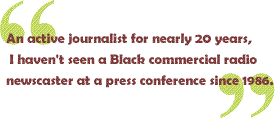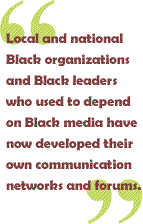Dear
BlackCommentator.com,
Thanks
for the "Who
Killed Black Radio News?" commentary. As someone
who is a lifelong student of Black media and an in-progress
biographer of a 1970s Philadelphia Black radio newscaster
named Mumia Abu-Jamal, I very much feel the pain of the BlackCommentator.com
editors concerning this subject.
 Who
knew that we were living in a Golden Age of Black Radio, one
that peaked in the 1970s before disappearing? The sobering
reality is that no one ever thinks or knows that he or she
is living in a so-called "era" until it's over.
Who
knew that we were living in a Golden Age of Black Radio, one
that peaked in the 1970s before disappearing? The sobering
reality is that no one ever thinks or knows that he or she
is living in a so-called "era" until it's over.
When
I shared a public
television forum with BlackCommentator.com's Glen Ford,
a former Black radio newscaster, last year I was saddened
to hear him say that every job he held in Black radio no longer
exists.
Frankly,
the stab wound of his remark has yet to heal. As a Black media
proponent, I've spent half my life training for jobs that
I now know only existed for Ford's generation, and even then,
only between 1967 and 1990.
I'm
35 years old, a full-fledged Gen Xer/hiphop Generation member.
I grew up in post-riot, post-Black Power era Newark, N.J.,
served by 1430 WNJR (which stood for North Jersey Radio),
a "soul" AM station. It was one of many such stations
that served Black communities nationwide. In the 1970s and
1980s, WNJR played R&B on weekdays and Saturdays and played
gospel and local church services all day Sunday. It sponsored
community events. Its fulltime newscaster was Bill Franklin.
He was my first hero. Franklin's outside-the-studio coverage
of the Essex County, N.J. community would be reflected in
the sound of his next morning's newscasts. The National Black
Network (now American Urban Radio Networks) aired an hourly
newscast when Franklin was out gathering sound. As a child,
I vaguely remember hearing an older-sounding man report from
the United Nations for NBN. His name was Mal Goode. Since
WNJR was a staple in our household, I think I was a teenager
before I discovered something called "white" radio
news! The WNJR I knew died in 1991, when its new owners decided
to sell airtime in blocks.
As
a young adult coming into racial consciousness, I was told
about a New York City "daylight" Black news/talk
radio AM station named WLIB. When I began listening to it
in 1987, it had a three-hour morning Black-oriented newscast
and talk programming for the  remainder
of the weekday. WLIB-AM had only one street reporter, Dominick
Carter, who seemed to be everywhere during New York's racial
unrest of the late 1980s. Civil rights activists such as C.
Vernon Mason, Alton Maddox and the Rev. Alfred Sharpton would
often make the evening local television newscast announcing
some march or rally on WLIB in 1987 or 1988. Its talk show
hosts rallied the Black community to vote for presidential
candidate Jesse Jackson in 1988, and for mayoral candidate
David Dinkins in 1989. WLIB, owned by Inner City Broadcasting
Corporation, was boldly Black and not afraid of causing controversy.
That was, until it was gutted in the mid-1990s when sister
"soul" station WBLS, squeezed by rival white radio
conglomerates who were out-souling and out-hiphopping them,
couldn't afford to subsidize the Revolution any longer. WLIB
is now a shadow of what it once was, and is proud of being
that shadow.
remainder
of the weekday. WLIB-AM had only one street reporter, Dominick
Carter, who seemed to be everywhere during New York's racial
unrest of the late 1980s. Civil rights activists such as C.
Vernon Mason, Alton Maddox and the Rev. Alfred Sharpton would
often make the evening local television newscast announcing
some march or rally on WLIB in 1987 or 1988. Its talk show
hosts rallied the Black community to vote for presidential
candidate Jesse Jackson in 1988, and for mayoral candidate
David Dinkins in 1989. WLIB, owned by Inner City Broadcasting
Corporation, was boldly Black and not afraid of causing controversy.
That was, until it was gutted in the mid-1990s when sister
"soul" station WBLS, squeezed by rival white radio
conglomerates who were out-souling and out-hiphopping them,
couldn't afford to subsidize the Revolution any longer. WLIB
is now a shadow of what it once was, and is proud of being
that shadow.
In
the late 1980s and early 1990s, I also used to listen to "Nighttalk,"
a national Black talk show broadcast from 1600 WWRL-AM, a
station in Queens that had a long history of being a "gospel"
powerhouse. Its host was Bob Law, a civil rights activist
and WWRL executive. Like most Black talk radio, it was a popular
show - among Baby Boomer Black activists. I didn't hold my
breath waiting to hear an advertisement. By 2000, that show
was gone, too, replaced by a late-night talker hosted by Bev
Smith, formerly of Black Entertainment Television. The shift
was a result of a power move executed by Radio One, who wanted
to co-syndicate Smith along with American Urban Radio Networks.
(Law's successor at "Nighttalk," civil rights activist
Ron Daniels, was out of luck.) Sadly, Smith's venture has
not caught fire, and Radio One cut its losses. Smith's national
show continues from the AURN headquarters in Pennsylvania,
but is not heard in D.C.
Why
did I bring all of this up? Because it's part of a current
history that mostly exists in memory. An active journalist
for nearly 20 years, I haven't seen a Black commercial radio
newscaster at a press conference since 1986.
 I'm
not going to defend Radio One, which on its Black news/talk
flagship, WOL-AM, broadcasts only a combination of ABC Radio
Network newscasts, AURN feeds (including its White House
correspondent April Ryan) and local news readers. But
you
might find this interesting:
I'm
not going to defend Radio One, which on its Black news/talk
flagship, WOL-AM, broadcasts only a combination of ABC Radio
Network newscasts, AURN feeds (including its White House
correspondent April Ryan) and local news readers. But
you
might find this interesting:
On
Radio One's WOL-AM yesterday [June 2], Bernie McCain, a 30-plus
veteran of Black radio, gave a little Black radio history
lesson in light of yesterday's FCC giveaway. He recalled how
Black radio SLOWLY began to serve the community with news
staffs - AFTER the riots, the time in which many of these
stations became Black-owned. He talked about how the Black
audience knew its Black newscasters because those news personnel
would be on the scene in those communities. He talked about
how Black communities depended on and responded to these newscasts.
Like you, he listed the destruction of Black radio news as
a by-product of Blacks in radio following whites in radio.
He also emphasized the difference between Black news and Black
talk. Frankly, yesterday was one of those rare occasions where
McCain felt like "telling it like it is." I'm sure
you miss that time. I missed it altogether.
Can
this era return? I don't think so; at least not in the same
way. Too many Black broadcast consumers in America's chocolate
cities are very comfortable with Tom Joyner's nationally syndicated
"infotainment" model, etc., local television newscasts
with Black anchors, two Black cable television newscasts ("BET
News" and "MBC News"), PBS-TV's "Tony
Brown's Journal," NPR's "The Tavis Smiley Show"
and the syndicated television program Mr. Ford helped create,
"America's Black Forum." In addition, local and
national Black organizations and Black leaders who used to
depend on Black media have now developed their own communication
networks and forums. (Which, I think, is a BIG reason why
the Black community outcry against Black media's de-volution
is so small.) And those my age and younger, used to getting
its news from the Internet and comedy monologues, won't remember
it being any other way.

I
actively mourn for the future Bill Franklins and Mumia Abu-Jamals
who will never discover their true calling and maximize their
creative potential because their traditional space will no
longer exist as a fulltime, paid profession. I also mourn
for those who will have to hip and hop to get their messages
heard by increasingly fragmented audiences. But what can I
say? I'm a 20th century traditionalist trying to adjust to
the 21st century. The forums we now mourn were new once. So
we can at least try to be optimistic and adjust to the fact
that mass media spaces are fluid constructs.
At
the same time, though, it could easily be argued that Black
America is comfortable with the current media environment
because it has been trained in a way that puts Pavlov's dog
to shame. I know of no evidence that would make me disagree
with that assessment.
TODD
STEVEN BURROUGHS is an independent researcher/scholar based
in Hyattsville, Md. A professional journalist since 1985,
he has written for The Source and The Crisis magazines,
Africana.com, The New York Amsterdam News, and The (Newark,
N.J.) Star-Ledger. He served as an editor, contributing
columnist and national correspondent for the NNPA News Service
(nnpa.org; BlackPressUSA.com), the nation's only news wire
for Black print media. Burroughs is a Ph.D. in Communication
from the University of Maryland's Philip Merrill College
of Journalism. He can be contacted at [email protected]


